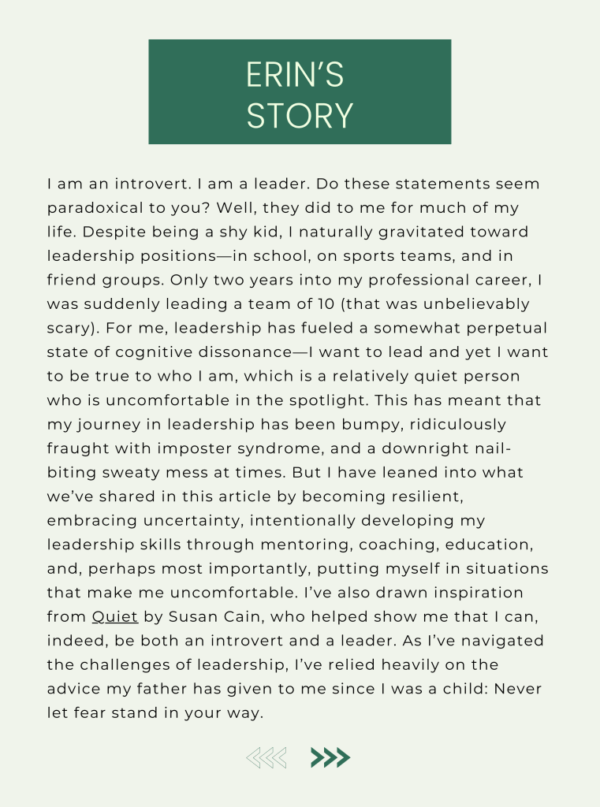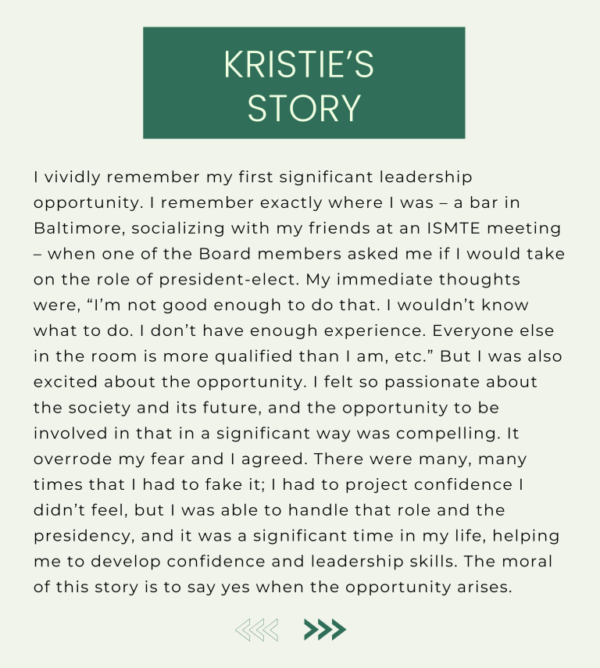Blog post
The Path to Leadership Requires Courage: Essential Advice for Early-Career Professionals
31 Oct 2024

First posted on the ORIGINal Thoughts Blog

Managing Director, Origin Editorial
LinkedIn: www.linkedin.com/in/erinlandis

Senior Partner, Origin Editorial
LinkedIn: https://www.linkedin.com/in/origineditorial/
Take Home Points:
- The early-career phase is a perfect time to develop leadership skills.
- An important step in the leadership path is to identify or develop key traits that are essential for effective leadership.
- There are specific skills that are critical to develop as you journey toward becoming a leader.
- Leadership isn’t without challenges; you must embrace vulnerability, step into uncertainty, and learn from failures.
If you’re an early-career (EC) professional and read the title of this post thinking “I’m too early in my career to start on a path to leadership,” or “The prospect of a leadership role seems scary,” you aren’t alone. We (the authors) remember the early years of our careers and how we often felt like fish out of water, grappling with learning the ropes of scholarly publishing. The last thing on our minds was developing leadership skills. But, perhaps surprisingly, the first several years of your career are foundational for future leadership opportunities and it’s never too early to develop the right skills, experience, education, and mindset to capitalize on those opportunities when they arise. Our purpose with this article is to provide critical guidance to EC professionals on what it takes to become a leader, including what key traits and skills are necessary; why it’s important to develop leadership qualities early in your career; what the importance of embracing failure in your leadership journey is; and what training and resources you can turn to for leadership development.
Identifying Early-Career Leadership Potential: Key Traits
Step one on your leadership journey is to identify if you have key traits that signal you’re destined to advance beyond simply doing the work to leading a group, team, department, or even organization. You might be surprised, upon reflection, that you have leadership potential. Or you might discover that you need to develop certain traits to ensure you’re prepared for leadership roles (and yes, you can develop these traits!). While experience and technical expertise are important signs of leadership potential in early-career professionals, the true markers of future leaders are often found in their mindset, behavior, and approach to challenges, looking beyond current performance to focus on potential—particularly the potential to grow, inspire, and lead teams effectively.
According to the Forbes Human Resources Council, there are many traits that can indicate an EC professional has leadership potential, including early adoption, eagerness for growth, being a self-starter, possessing courage, and others.
Early Adoption: A clear sign of leadership potential is when individuals show a proactive approach to challenges. Early adopters are not just willing to try new things—they actively seek out opportunities to improve processes and are quick to implement feedback. This behavior demonstrates a combination of curiosity, resilience, and forward-thinking, all of which are essential traits for effective leaders. A willingness to take initiative and step outside comfort zones signals a readiness to lead and explore innovative solutions.
Eagerness for Growth: Individuals who consistently look for opportunities to grow beyond their current role display a crucial element of leadership: the drive for continuous self-improvement.
Being a Self-Starter: Successful leaders are often described as self-starters and doers—individuals who “relentlessly strive for the good of the company and to achieve strong results.” These individuals don’t hesitate to roll up their sleeves and put in the hours necessary to get the job done. They take responsibility for their work and are driven by a strong sense of ownership and commitment to the organization’s success.
Possessing Courage. Being a leader is not for the faint of heart. You must be willing to take risks, make hard decisions, and face uncertainty time and time again. Having courage (along with vulnerability and determination) is a foundational trait for becoming an effective leader.
Dare to Develop Leadership Skills
Key Skills of Effective Leadership
Upon reflection, if you realize you embody the right character traits to become a leader or are interested in developing those traits, what is the next step? Should you just focus on becoming highly proficient at your job, accumulating the necessary technical skills and experience? Being a leader requires more than just job-specific know-how; you must also acquire leadership skills that are necessary for good leaders. That ideal combination results in the most effective leaders—it’s likely we’ve all been in situations where leaders have had one or the other and it’s clear to us that the lack of either results in poor leadership. As an EC professional, you’ll likely have plenty of opportunities to learn the technical skills of scholarly publishing, not only from the jobs you hold but from engagement in professional organizations that provide access to education and networking opportunities. But what about those leadership skills? What are they?
According to an article from Coursera, there are six key leadership skills to develop if you’re interested in being a leader. They include:
- Communication—clearly explaining everything you need from those you lead, setting expectations for goals and tasks.
- Negotiation—understanding the perspectives and interests of all stakeholders and facilitating a compromise.
- Conflict resolution—knowing how to effectively resolve disputes.
- Decision-making—making decisions (including the hard ones) that benefit the overall good of the team and organization.
- Problem-solving—having the ability to predict, identify, and define problems in the workplace and develop solutions to the problems.
- Relationship-building—knowing how to build bonds among team members and foster a collaborative and positive work culture.
Linda Hill, a Harvard Business School professor and top leadership expert, explains that “Leadership is a process of self-development. No one can teach you how to lead; you need to be willing and able to learn how to lead. Mostly we learn from our experiences and facing adversity. Stepping outside of the spaces where we feel safe is a powerful teacher.” From her perspective, not only are the above skills essential elements of effective leadership, there are also several personal qualities to develop:
- Authenticity—be genuine and embody your best self. Competence is not enough. People need to be able to trust you so that they will take risks with you.
- Curiosity—look at your team/organization from the perspective of external stakeholders. This helps make informed decisions beyond internal dynamics.
- Analytical prowess—break down complex problems and come up with new solutions. Be attentive to patterns.
- Adaptability—change with the times. This will help develop an agile team culture, allowing the team to pivot quickly as needed.
- Creativity—bring ideas that are new and useful to the team/organization.
- Comfort with ambiguity—understand how things are connected, this allows you to deal with opposing ideas or competing priorities in the face of uncertainty.
- Resilience—weather-changing circumstances and recalibrate when necessary.
- Empathy—develop emotional intelligence; be able to step into someone else’s shoes and understand their priorities and what matters to them. This allows you to create a more trusting and supportive environment.
The Importance of Developing Leadership Skills as an EC Professional
You might be asking yourself, why do I need to focus on leadership skills now, as an EC professional? Won’t I just learn those skills along the way? Don’t I have time to learn them gradually? The intentional development of leadership skills as an EC professional is just as important as learning technical skills and job-based competencies. While this is especially true if you believe a leadership role is in your future, it is also true if you simply wish to fortify your professional development regardless of your career trajectory. There are many benefits of cultivating leadership skills For example, you’ll set yourself up for long-term success by focusing on the building blocks of strong professionalism. As stated previously, you’ll also cultivate problem-solving skills, which will increase your ability to be analytical and innovative, qualities that are highly valued in team members at all levels. Additionally, building your leadership skills will help you in team environments by contributing to a positive and productive work culture. All of these efforts combine to accelerate career progression, positioning you to take on meaningful work and greater responsibilities.
Fake it ‘Til you Make it? Imposter Syndrome and Leadership
Despite the myriad leadership positions we (the authors) have held throughout our careers, there can still be twinges of self-doubt when we question if we’re leading effectively or if we even deserve such positions. We know we aren’t alone in these thoughts, and leaders at all levels and all career stages deal with this common phenomenon known as “imposter syndrome.” According to Psychology Today, “people who struggle with imposter syndrome believe that they are undeserving of their achievements and the high esteem in which they are, in fact, generally held. They feel that they aren’t as competent or intelligent as others might think—and that soon enough, people will discover the truth about them.”
While it is not a formally recognized psychological disorder, its prevalence among high achievers is undeniable, particularly among leaders. Why would that be? Why would people who’ve worked so hard and are so clearly competent at what they do contend with imposter syndrome? Leadership positions are often highly visible and come with high expectations, which can amplify feelings of inadequacy. Leaders with imposter syndrome are not just fearful of failure; they are often consumed by the fear of being exposed as a fraud. Despite their accomplishments, they harbor anxiety that their success is a result of luck or circumstance rather than skill or talent. This internal struggle can lead to significant issues like burnout, heightened stress, and an inability to delegate effectively, as leaders may feel they need to overcompensate for their perceived shortcomings.
What does this mean for EC professionals? It means that as you progress along your leadership path, if you doubt yourself or if you second-guess if you deserve the leadership opportunities presented to you, you are not alone. Hang in there! You must learn to embrace the uncomfortable feelings of doubt and vulnerability. Renowned leadership expert and author Brené Brown has extensively researched the role of vulnerability in leadership. In her book, Rising Strong, she states, “Vulnerability is not winning or losing; it’s having the courage to show up and be seen when we have no control over the outcome. Vulnerability is not weakness; it’s our greatest measure of courage.” This perspective reframes the discomfort of leadership, particularly for those struggling with imposter syndrome. Leaders must embrace vulnerability as a form of courage, recognizing that stepping into uncertainty, despite self-doubt, is an inherent part of leading effectively.
Dare to Fail: Navigating Challenges
Leadership, by its very nature, can be a scary prospect. You will stumble and fall, whether you are an experienced leader or just starting in the role. It’s important to understand, as an EC professional, that you must possess a willingness to move forward, despite the uncertainty and potential pitfalls; this is what distinguishes leaders from followers. Yet, to truly lead is to embrace failure—not as a final defeat, but as a vital element of growth and discovery. As Colin Trumbull articulated in his Editorial Office News article “I Am Editor: I Goofed,” “Making mistakes can be safer than we think, but we have to be willing to invest the effort to respond to them correctly.” The crux of leadership, then, lies not in avoiding failure, but in developing the capacity to rise from it, adapting and growing stronger with each fall.
The reluctance to embrace failure stems, in part, from our aversion to the emotional toll it exacts. Shame, in particular, is a powerful deterrent that often prevents individuals from taking risks. Yet, as Brené Brown argues in Dare to Lead, the key to overcoming this fear is not to avoid failure, but to prepare for it. Leaders recover gracefully by accepting responsibility, allowing themselves to process their emotions, and move forward with resilience. This sentiment is echoed in Trumbull’s assertion: “Let a mistake refine you, not define you.” The essence of leadership, therefore, is not in the avoidance of error but in the deliberate and thoughtful recovery from it.
Leaders must also understand that failure, while uncomfortable, is a critical aspect of the growth process. As Brown notes in Rising Strong, the act of falling is only the beginning; true leadership is demonstrated in the act of rising again, and you can do this! The process of recovery requires fortitude, courage, and a deep sense of purpose, and you are capable of these traits. Failure is not to be viewed as a definitive endpoint but rather as a stepping stone on the journey toward success. Moreover, it offers a unique opportunity for reflection and growth. Success, in its purest form, cannot be achieved without the trials of failure.
This reality is particularly evident in the scholarly publishing industry, where much of the progress in research and discovery is built upon a foundation of failed experiments. Failure, in this context, is not personal inadequacy but a necessary step in the advancement of knowledge. Researchers, like leaders, embrace these lessons, using them to refine their work and push the boundaries in their respective fields.
The journey from failure to success is not one that can be undertaken in isolation. As leaders, we must extend empathy to ourselves and to those around us, embracing our failures and giving others permission to fail. Empathy allows us to acknowledge the emotional toll of failure while simultaneously using it as a tool for growth. Brown observes in Rising Strong that hiding from failure “kills our spirits, hopes, potential, creativity, and our ability to lead.” In contrast, embracing failure as part of the leadership journey fosters resilience, creativity, and ultimately, success.
You’re Up for the Challenge of Becoming a Leader? Now What?
Phew! Now you know that to become a leader you need to be aware of what traits you possess or need to nurture, what skills to develop, that imposter syndrome is a THING, and you’d better accept that failure will happen. This can seem a little daunting, but there are so many resources to support you along your journey.
First and foremost, your colleagues and coworkers are excellent resources for you. You can be explicit with them about your desire to be a leader and even request their support through informal mentorship. You can also identify leaders on your team or in your department or organization who you can model your own leadership development after. We (the authors) have several individuals in our lives who played direct and indirect roles in our leadership paths.
You can also consider taking an educational approach to leadership by engaging in formal programs that are offered either in person or online. When choosing a program, evaluate the options according to the following factors:
- Consider your skills. Identify the areas of leadership where you excel and those where you face challenges. Look for a program that specifically addresses your growth areas.
- Assess your experience. EC professionals, in particular, should consider a more comprehensive program that covers a wide range of skills to build a strong foundation.
- Research the instructors and courses. Choose leadership training that not only provides learning but also offers opportunities for networking with professionals, allowing you to gain insight from their experiences and observe successful leadership in action.
- Determine your preferred style of leadership. Different programs may emphasize specific leadership approaches. Find one that aligns with your preferred leadership style.
- Understand the level of leadership that you seek. A well-rounded training program should help you gain the skills you need, inspire you to succeed, and refine your personal leadership vision.
- Seriously consider taking a public speaking course because, as a leader, you’ll frequently find yourself in a position where you must be comfortable with speaking to groups of people, ranging from small teams to large audiences.
Books and articles on leadership abound—these are another great way to be intentional about developing a path to leadership. For example, the Harvard Business Review often publishes articles on leadership, as does LinkedIn. We’ve mentioned books by Brené Brown, but there are myriad other books out there—check out this list from Forbes for other books you might consider reading.
Finally, the organization where you work, or perhaps even a publishing organization of which you’re a member, might offer leadership seminars, webinars, or sessions at annual meetings. Be sure to take advantage of those—not only will you learn a lot, but you’ll also signal to those around you (and particularly those who supervise you), that you are interested in leadership.
Parting Thoughts
We hope that our article has challenged the notion that leadership development is reserved for seasoned professionals. We’ve shown that the early years of your career are the perfect time to cultivate the skills and mindset that will propel you toward leadership roles. We know from personal experience that the journey towards leadership isn’t without its challenges. The key is to embrace vulnerability, step into uncertainty, and embrace failure. Resilient leaders learn from their mistakes, adapt, and rise stronger.
Conflicts of Interest:
None to disclose
Origin Editorial is now part of KnowledgeWorks Global Ltd., the industry leader in editorial, production, online hosting, and transformative services for every stage of the content lifecycle. We are your source for society services, market analysis, intelligent automation, digital delivery, and more. Email us at info@kwglobal.com.
Related Posts

From AI Assistance to AI Operations: Takeaways from Eight Trend Reports for Scholarly Publishing

Publishing Predictions: What to Expect from 2026




